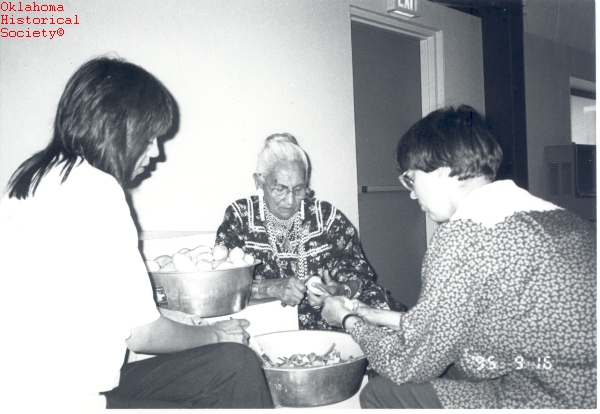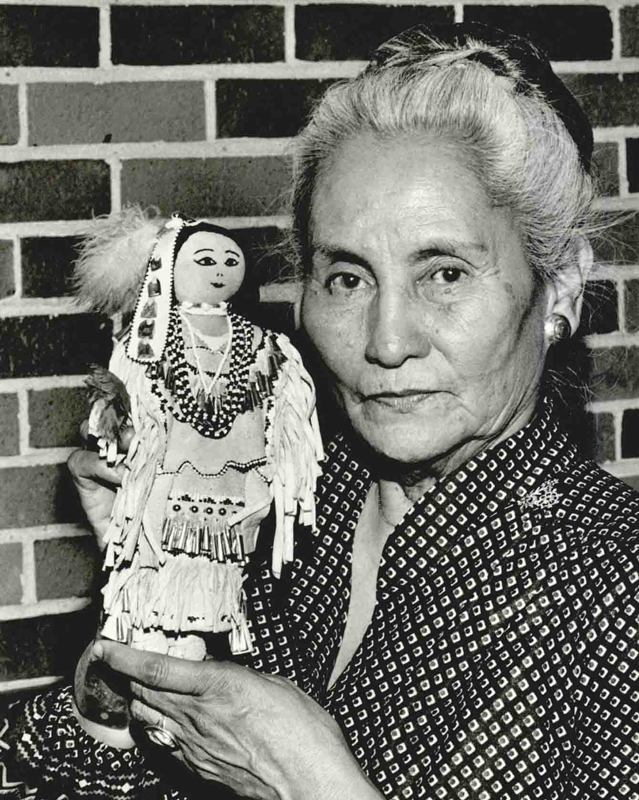The Encyclopedia of Oklahoma History and Culture
CLEGHORN, MILDRED IMOCH (1910–1997).
Traditional doll maker, schoolteacher, and Fort Sill Apache tribal leader, Mildred Imoch (En-Ohn or Lay-a-Bet) was born a prisoner of war at Fort Sill, Oklahoma, on December 11, 1910. Her grandfather had followed Geronimo into battle, and her grandparents and parents were imprisoned with the Chiricahua Apache in Florida, Alabama, and at Fort Sill. Her family was one of only seventy-five that chose to remain at Fort Sill instead of relocating to the Mescalero Reservation in New Mexico in 1913.
Mildred Cleghorn attended school in Apache, Oklahoma, at Haskell Institute in Kansas, and at Oklahoma State University, receiving a degree in home economics in 1941. After she finished her formal education, she spent several years as a home extension agent in Kansas, Oklahoma, and New Mexico, and then worked for sixteen years as a home economics teacher, first at Fort Sill Indian School at Lawton and then at Riverside Indian School at Anadarko. Later, she taught kindergarten at Apache Public School in Apache. She was married to William G. Cleghorn, whom she had met in Kansas, and their union produced a daughter, Peggy. In 1976 Mildred Cleghorn became chairperson of the Fort Sill Apache Tribe, newly organized as a self-governing entity. Her leadership in that government revolved around preserving traditional history and culture. She retired from the post at age eighty-five in 1995.
Cleghorn's many awards and recognitions included a human relations fellowship at Fisk University in 1955, the Ellis Island Award in 1987, and the Indian of the Year Award in 1989. She also served as an officer in the North American Indian Women's Association, as secretary of the Southwest Oklahoma Intertribal Association, and as treasurer of the American Indian Council of the Reformed Church of America.
Above all, Mildred Cleghorn was a cultural leader. She spent a lifetime creating dolls authentically clothed to represent forty of the tribes she had encountered in her teaching career. Her work was exhibited at the Smithsonian Institution in Washington, D.C. Her life ended in an automobile accident near Apache on April 15, 1997.
See Also
Browse By Topic
American IndiansWomen
Explore
PeopleAmerican Indian
Public Servants and Civic Leaders
Women
Learn More
Julie L. Abner, "Mildred Imoch Cleghorn," in Native American Women: A Biographical Dictionary, ed. Gretchen M. Bataille and Laurie Lisa (New York: Routledge, 2000).
"Mildred Cleghorn," Vertical File, Research Division, Oklahoma Historical Society, Oklahoma City.
H. Henrietta Stockel, Chiricahua Apache Women and Children: Safekeepers of the Heritage (College Station: Texas A&M University Press, 2000).
H. Henrietta Stockel, Women of the Apache Nation: Voices of Truth (Reno: University of Nevada Press, 1991).
Citation
The following (as per The Chicago Manual of Style, 17th edition) is the preferred citation for articles:
Dianna Everett, “Cleghorn, Mildred Imoch,” The Encyclopedia of Oklahoma History and Culture, https://www.okhistory.org/publications/enc/entry?entry=CL010.
Published January 15, 2010
© Oklahoma Historical Society



